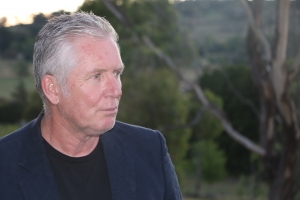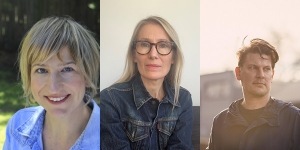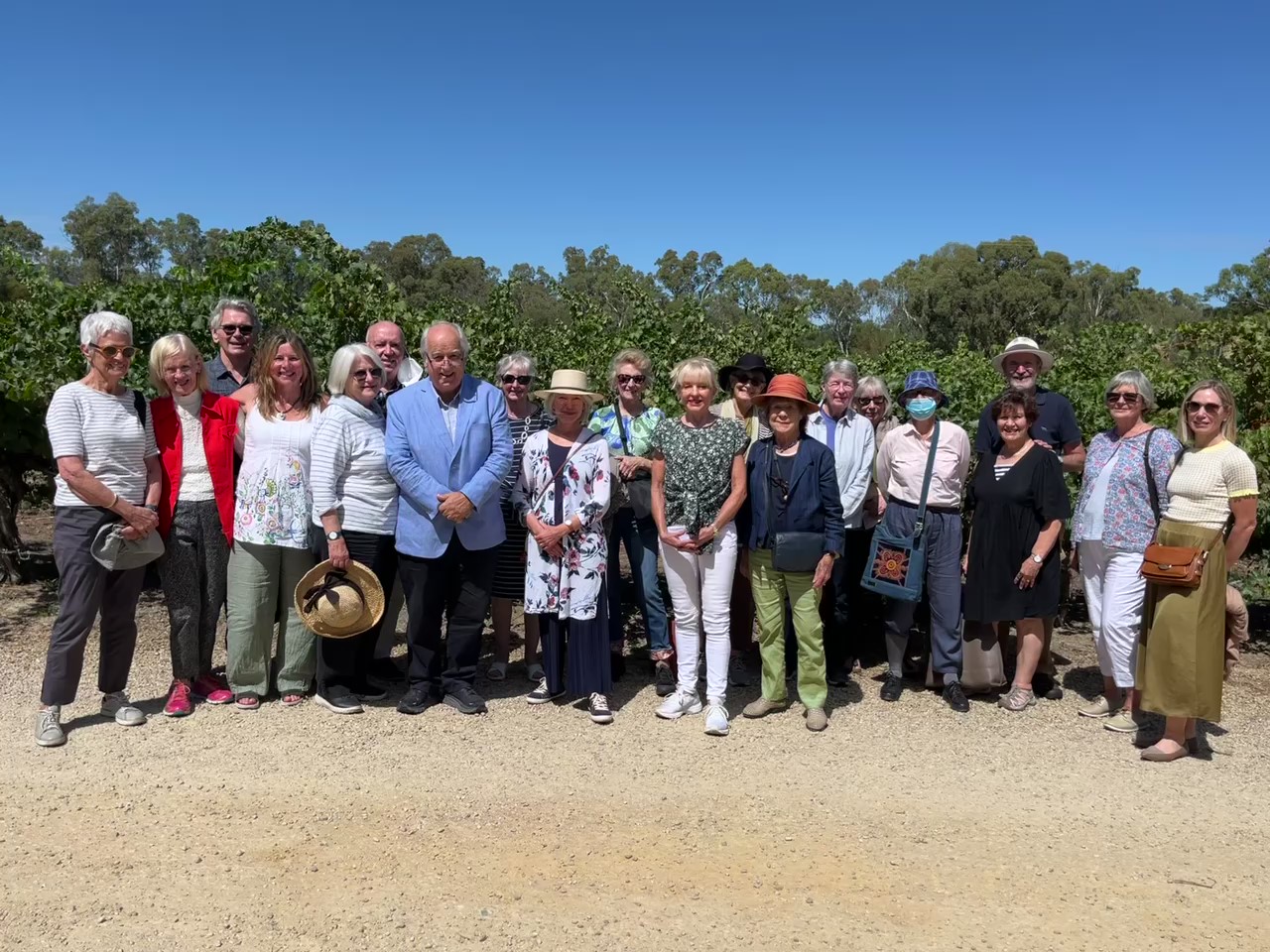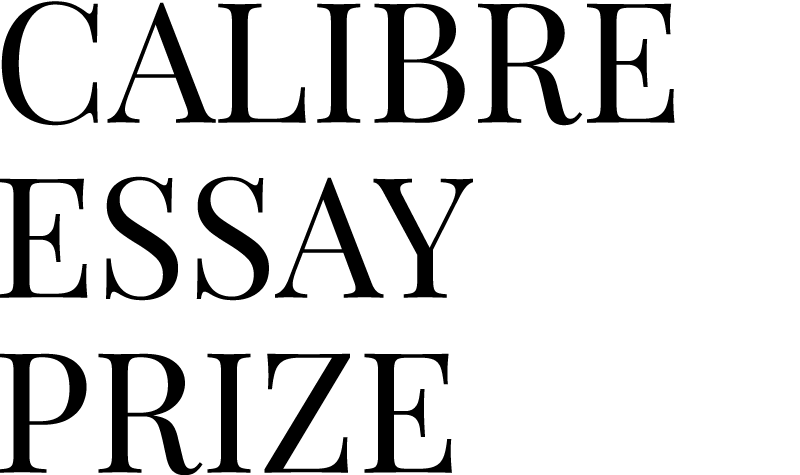Information (254)
Children categories
Thanking our Partners (14)
Australian Book Review is assisted by the Australian Government through Creative Australia, its principal arts investment and advisory body, and is also supported by the South Australian Government through Arts South Australia. We also acknowledge the generous support of our university partner, Monash University; and we are grateful for the support of the Copyright Agency Cultural Fund, Good Business Foundation (an initiative of Peter McMullin AM), the Sidney Myer Fund, Australian Communities Foundation, Sydney Community Foundation, AustLit, Readings, our travel partner Academy Travel, the City of Melbourne, and Arnold Bloch Leibler.
View items...Index for 2021: Nos 428–438 & online features
ABR Index 2021
NB: this index includes material published in the print magazine and online in 2021.
2021 Australian Book Review Index
Subscribers can read these reviews online here.
ABERDEEN, Lucinda and Jennifer Jones (eds), Black, White and Exempt: Aboriginal and Torres Strait Islander lives under exemption, Aboriginal Studies Press, 432/10, Marilyn Lake
ADAM, Pip, Nothing to See, Giramondo, 431/29, Maks Sipowicz
ADLER, Eric, The Battle of the Classics, Oxford University Press, online only, Matthew R. Crawford
AHMAD, Michael Mohammed, The Other Half of You, Hachette Australia, 434/42, Shannon Burns
AHMED, Sara, Complaint!, Duke University Press, 435/40, Zora Simic
ALLINSON, Miles, In Moonland, Scribe, 435/19, Scribe, 435/19, Daniel Juckes
ALTMAN, Dennis, God Save the Queen: The strange persistence of monarchies, Scribe, 436/47, John Rickard
ANDRADA, Eunice, TAKE CARE, Giramondo, 437/60, Prithvi Varatharajan
ANGEL, Katherine, Tomorrow Sex will be Good Again, Verso, 432/16, Zora Simic
ARALUEN, Evelyn, Dropbear, University of Queensland Press, 437/60, Prithvi Varatharajan
ARCHBOLD, Charlie, Indigo Owl, Wakefield Press, 428/47, Benjamin Chandler
ARRINGTON, Lauren, The Poets of Rapallo: How Mussolini’s Italy shaped British, Irish, and US writers, Oxford University Press, online only, Sean Pryor
ARUDPRAGASM, Anuk, A Passage North, Granta, 438/34, Dilan Gunawardana
ASPHYXIA, Future Girl, Allen & Unwin, 428/47, Benjamin Chandler
ATHERTON, Cassandra, Hold Your Fire, Scribner Australia, 429/39, Cassandra Atherton
ATTWOOD, Bain, William Cooper: An Aboriginal life, The Miegunyah Press, 438/13, Penny Russell
ATWOOD, Bain, Empire and the Making of Native Title: Sovereignty, property and Indigenous people, Cambridge University Press, 431/7, Lisa Ford
ATWOOD, Margaret, Dearly, Chatto & Windus, 429/56, David Mason
BACON, Eugen, The Road to Woop Woop and other stories, Meerkat Press, 428/45 Susan Midalia
BAIL, Murray, He., Text Publishing, 429/26, Gerard Windsor
BALINT, Ruth, and Kalman, Julie, Smuggled: An illegal history of journeys to Australia, NewSouth, 434/29, Elizabeth Holdsworth
BALOUGH, Terry and Kay Dreyfus (eds), Distant Dreams: The correspondence of Percy Grainger and Burnett Cross, 1946-60, Lyrebird Press, 430/63, David Pear
BALTHROP-LEWIS, Alda, Thoreau’s Religion: Walden Woods, social justice and the politics of asceticism, Cambridge University Press, 435/55, Danielle Celermajer
BARTON, Rod, The Life of a Spy: An education in truth, lies and power, Black Inc., 437/52, Andrew West
BAXTER, Ella, New Animal, Allen & Unwin, 431/31, Debra Adelaide
BEASLEY, Richard, Dead in the Water: A very angry book about our greatest environmental catastrophe … the death of the Murray-Darling Basin, Allen & Unwin, 431/44, Kirsty Howey
BEAUMONT, Jerzy, Errant Night, Recent Work Press, 432/55, James Antoniou
BECHDEL, Alison, The Secret to Superhuman Strength, Jonathan Cape, 437/34, Bernard Caleo
BECK, Koa, White Feminism: From the suffragettes to influencers and who they leave behind, Simon & Schuster, 430/16, Megan Clement
BEDFORD, Kavita, Friends and Dark Shapes, 430/34, Anna MacDonald
BEEHLER, Bruce M., New Guinea: Nature and culture of Earth’s grandest island, Princeton University Press, 430/49, Peter Menkhorst
BEHRENDT, Larissa, After Story, University of Queensland Press, 433/36, Debra Adelaide
BERESFORD, Quentin, Wounded Country: The Murray-Darling Basin – a contested history, NewSouth, Cameron Muir
BERGANTZ, Alexis, French Connection: Australia’s cosmopolitan ambitions, NewSouth, 436/43, Jim Davidson
BETTS, Alexander, The Wealth of Refugees: How displaced people can build economies, Oxford University Press, 433/24, Maria O’Sullivan
BINET, Laurent, translated by Sam Taylor, Civilisations, Harvill Secker, 435/20, Cristina Savin
BIRCH, Tony, Dark as Last Night, University of Queensland Press, 434/40, Anthony Lynch
BIRTLES, Bill, The Truth about China: Propaganda, patriotism, and the search for answers, Allen & Unwin, 434/10, Michael Dwyer
BITTO, Emily, Wild Abandon, Allen & Unwin, 437/31, Amy Baillieu
BLAINE, Lech, Car Crash, Black Inc., 431/54, Jack Cameron Stanton
BLOOM, Harold, Take Arms against a Sea of Troubles: The power of the reader’s mind over a universe of death, Yale University Press, 431/22, James Ley
BLOSHTEYN, Maria (ed.), Russia is Burning: Poems of the Great Patriotic War, Smokestack Books, 428/55, David Wells
BOBIS, Merlinda, The Kindness of Birds, Spinifex Press, 438/35, Francesca Sasnaitis
BOLTON, Ken, Salute, Puncher & Wattmann, 428/53, Luke Beesley
BONYHADY, Tim, Two Afternoons in the Kabul Staudium: A history of Afghanistan through clothes, carpets and the camera, Text Publishing, 436/7, Morag Fraser
BOWEN, Chris, Labor People: The stories of six true believers, Monash University Publishing, online only, Lyndon Megarrity
BOYCE, James (ed.), Inga Clementine: Selected writings, Black Inc., 432/15, Tom Griffiths
BRACEWELL, Lorna, Why We Lost the Sex Wars, University of Minnesota Press, 432/16, Zora Simic
BRANDS, H.W., The Zealot and the Emancipator: John Brown, Abraham Lincoln and the struggle for American Freedom, Knopf, 429/21, Clare Corbould
BREAKEY, Hugh, The Beautiful Fall, Text, 435/21, Elizabeth Bryer
BRENNAN, Bernadette, Leaping into Waterfalls: The enigmatic Gillian Mears, Allen & Unwin, 438/16, Brenda Walker
BRENNAN, Timothy, Places of Mind: A life of Edward Said, Bloomsbury, 437/23, James Jiang
BRETT, Judith, Doing Politics: Writing on public life, Text Publishing, 438/44, Morag Fraser
BROOKS, David, Animal Dreams, Sydney University Press, online only, Ben Brooker
BROOKS, Michael, The Art of More: How mathematics created civilisation, Scribe, 437/57, Robyn Arianrhod
BROPHY, Kevin, In This Part of the World, Melbourne Poets Union, 430/43, Rose Lucas
BROW BOOKS, Dizzy Limits: Recent experiments in Australian nonfiction, Brow Books, 431/45, James Antoniou
BRYANT, Nick, When America Stopped Being Great: A history of the present, Viking, 428/19, Andrew West
BUNBURY, Alisa (ed.), Pride of Place: Exploring the Grimwade collection, The Miegunyah Press/Potter Museum of Art, 434/62, John Arnold
BURGMANN, Meredith and Nadia Wheatley, Radicals: Remembering the Sixties, NewSouth, 433/23, Kerryn Goldsworthy
BURROWS, Michael, Where the Line Breaks, Fremantle Press, 434/55, Alex Cothren
BURUMA, Ian, The Churchill Complex: The rise and fall of the special relationship, Atlantic Books, 429/20, Timothy J. Lynch
BUTLER, Judith, The Force of Nonviolence: An ethico-political bind, Verso Books, 429/51, Nicholas Bugeja
BUTTIGIEG, Pete, Trust: America’s best chance, John Murray, 431/53, Simon Caterson
BYRON, John, The Tribute, Affirm Press, 434/41, Jay Daniel Thompson
BYRSKI, Liz (ed.), Women of a Certain Rage, Fremantle Press, 429/28, Caitlin McGregor
CAIANI, Ambrogio A., To Kidnap a Pope: Napoleon and Pius VII, Yale University Press, 431/49, Miles Pattenden
CAREY, Gabrielle, Only Happiness Here: In search of Elizabeth von Arnim, University of Queensland Press, 428/50, Juliane Roemhild
CARLYON, Les, A Life in Words: Collected writings from Gallipoli to the Melbourne Cup, Allen & Unwin, 438/30, Seumas Spark
CARROLL, Steven, O, Fourth Estate, 430/31, Shannon Burns
CASTLES, Belinda (ed.), Reading Like an Australian Writer, NewSouth, 431/47, Polly Simons
CAVE, Damien, Into the Rip: How the Australian way of risk made my family stronger, happier… and less American, Simon & Schuster, 437/53, David Mason
CAYANAN, Mark Anthony, Unanimal, Counterfeit, Scurrilous, Giramondo Publishing, 432/55, James Antoniou
CELERMAJER, Danielle, Summertime: Reflections on a vanishing future, Hamish Hamilton, 429/49, Alice Bishop
CHANDLER, Tania, All That I Remember about Dean Cola, Scribe, 433/41, Susan Midalia
CHESTERMAN, Simon, We, the Robots? Regulating artificial intelligence and the limits of the law, Cambridge University Press, 438/61, Henry Fraser
CHONG, Eileen, A Thousand Crimson Blooms, University of Queensland Press, 433/53, James Jiang
CLARK, Paige, She Is Haunted, Allen & Unwin, 438/35, Francesca Sasnaitis
CLARKE, Josephine, Recipe for Risotto, UWAP, 428/54, Ella Jeffery
CLAYTON, Eleanor, Barbara Hepworth: Art and life, Thames & Hudson, 436/63, Gregory Day
CLEARY, Paul, Title Fight: How the Yindjibarndi battled and defeated a mining giant, Black Inc., 437/10, Stephen Bennetts
COLLINS, Carolyn, Save Our Sons: Women, dissent and conscription in the Vietnam War, Monash University Publishing, 433/22, Michelle Arrow
COLLINS, Christy, The Price of Two Sparrows, Affirm Press, 430/34, Anna MacDonald
CONRAD, Peter, The Mysteries of Cinema: Movies and imagination, Thames & Hudson, 436/67, James Antoniou
COSTA, Margaret Jull (ed.), The Penguin Book of Spanish Short Stories, Penguin Classics, 434/43, Alice Whitmore
CRAWFORD, Anwen, No Document, Giramondo Publishing, 430/17, Francesca Sasnaitis
CROGGON, Alison, Monsters, Scribe, 430/23, Sarah Walker
CROTTY, Martin, Neil J. Diamant and Mark Edele, The Politics of Veteran Benefits in the Twentieth Century: A comparative history, Cornell University Press, 429/15, Christina Twomey
CROUCHER, Gwilym and James Waghorne, Australian Universities: A history of common cause, UNSW Press, 429/16, Peter Tregear
CUNNINGHAM, Sophie (ed.), Fire Flood Plague: Australian Writers respond to 2020, Vintage Books, 428/60, Adele Dumont
CUSK, Rachel, Second Place, Faber, 434/39, Melinda Harvey
DALGARNO, Paul, Poly, Ventura Press, 428/48, Kate Crowcroft
DAVIDSON, Toby, Four Oceans, Puncher & Wattmann, 431/38, Peter Kenneally
DAVIS, Megan and George Williams, Everything You Need to Know About the Uluru Statement from the Heart, UNSW Press, 433/11, Kevin Bell
DAWKINS, Young, Slow Walk Home, Red Squirrel Press, 438/53, Luke Beesley
DAWSON, Hannah (ed.), The Penguin Book of Feminist Writing, Penguin Classics, 432/21, Megan Clement
DE BEAUVOIR, Simone, translated by Lauren Elkin, The Inseparables, Vintage, 438/33, David Jack
DE KRESTER, Michelle, Scary Monsters, Allen & Unwin, 436/36, Shannon Burns
DELAP, Lucy, Feminisms: A global history, Penguin, 430/15, Zora Simic
DILLON, Brian, Suppose a Sentence, Fitzcarraldo Editions, 429/29, Luke Beesley
DISHER, Garry, Consolation, Text Publishing, 428/40, Tony Birch
DISHER, Garry, The Way It Is Now, Text Publishing, 438/37, Tony Birch
DÖBLIN, Alfred (translated by Imogen Taylor), Two Women and a Poisoning, Text Publishing, 433/39, Joachim Redner
DODD, Andrew, and Matthew Ricketson (eds), Upheaval: Disrupted lives in journalism, UNSW Press, 437/26, Gemma Nisbet
DODD, Benjamin, Airplane Baby Banana Blanket, Recent Work Press, 428/54, Ella Jeffery
DOHERTY, Peter, An Insider’s Plague Year, Melbourne University Press, 435/12, Diane Stubbings
DOHRA, Ahmad (ed.), The Penguin Book of Migration Literature, Penguin Classics, 430/52, Merav Fima
DOVEY, Ceridwen, Life After Truth, Viking, 428/41, Josephine Taylor
DOWN, Jennifer, Bodies of Light, Text Publishing, 436/34, Susan Midalia
DRISCOLL, Oliver, I Don’t Know How That Happened, Recent Works Press, 430/42, Gig Ryan
DUNN, Winnie, Stephen Pham, and Phoebe Grainer, Racism: Stories on fear, hate and bigotry, 433/15, Mindy Gill
EALOM, Jaivet, Escape from Manus: The untold true story, Viking, 435/42, Justine Poon
EASTON, Max, The Magpie Wing, Giramondo, 438/39, Alex Cothren
EBERHARD, Adrienne, Chasing Marie Antoinette All over Paris, Black Pepper, 431/38, Peter Kenneally
EDGAR, Stephen, The Strangest Place: New and selected poems, Black Pepper, 429/53, Geoff Page
EILENBERGER, Wolfram, translated by Shaun Whiteside, Time of the Magicians: The invention of modern thought, 1919-1929, Allen Lane, 428/59, Janna Thompson
ELKIN, Lauren, No. 91/92: A Parisian bus diary, Tablo Tales, 437/50, Megan Clement
ELLIS, Kate, Sex, Lies and Question Time, Hardie Grant Books, 433/14, Katrina Lee-Koo
ELVEY, Anne, Obligations of Voice, Recent Work Press, 438/53, Luke Beesley
ERRINGTON, Wayne and Peter van Onselen, How Good is Scott Morrison?, Hachette, 432/23, Paul D. Williams
EVANS, Carolyn, Adrienne Stone, and Jade Roberts, Open Minds: Academic freedom and freedom of speech in Australia, La Trobe University Press, 430/13, Kieran Pender
EVERLY-WILSON, Stuart, Low Expectations, Text Publishing, 430/34, Anna MacDonald
FALCONER, Delia, Signs and Wonders: Dispatches from a time of beauty and loss, Scribner, 437/43, Jonica Newby
FALCONER, Delia, Sydney (Second Edition), NewSouth, 429/57, Jacqueline Kent
FARRELLY, Elizabeth, Killing Sydney: The fight for a city’s soul, Picador, 429/57, Jacqueline Kent
FERGUSON, Niall, Doom: The politics of catastrophe, Allen Lane, 434/12, Benjamin Huf
FISCHER, Luke, and Davis Macauley (eds), The Seasons: Philosophical, literary and environmental perspectives, SUNY Press, 436/54, Tony Hughes-d’Aeth
FISHER, Catherine, Sound Citizens: Australian women broadcasters claim their voice, 1923-1956, Australian National University Press, 435/39, Yves Rees
FITCH, Toby, Sydney Spleen, Giramondo, 435/45, Pam Brown
FITZGERALD, Helen, Ash Mountain, 431/32, David Whish-Wilson
FITZPATRICK, Sheila, White Russians, Red Peril: A Cold War history of migration to Australia, La Trobe University Press, 431/10, Stuart Macintyre
FLANAGAN, Richard, Toxic: the rotting underbelly of the Tasmanian salmon industry, Penguin Random House, 432/18, James Boyce
FLANNERY, Tim, The Climate Cure: Solving the climate emergency in the era of Covid-19, Text Publishing, 429/46, Alistair Thomson
FOURNIER, Lauren, Autotheory as Feminist Practice in Art, Writing, and Criticism, MIT Press, 431/51, Dženana Vucic
FRANZEN, Jonathan, Crossroads, Fourth Estate, 436/32, Declan Fry
FRENKEL, Sheera, and Kang, Cecilia, An Ugly Truth: Inside Facebook’s battle for domination, Hachette, 435/7, Joel Deane
FRITH, David, Archie Jackson: Cricket’s tragic genius, Slattery Media Group, 428/63, Daniel Seaton
GALGUT, Damon, The Promise, Chatto & Windus, 436/37, Marc Mierowsky
GARDNER, James, The Louvre: The many lives of the world’s most famous museum, Grove Press, 428/71, Christopher Menz
GATTI, Tom (ed.), Long Players: Writers on the albums that shaped them, Bloomsbury, 437/25, Andrew Ford
GEORGE, Kathy, Sargasso, HQ Fiction, 432/40, Georgia White
GIBBS, Alison, Repentance, Scribe, 430/34, Anna MacDonald
GLEESON, Sinéad, The Art of the Glimpse: 100 Irish short stories, Apollo, 433/40, Geordie Williamson
GLOVER, Dennis, Factory 19, Black Inc., 428/44, Frank Bongiorno
GODFREY-SMITH, Peter, Metazoa: Animal minds and the birth of consciousness, William Collins, 428/62, Diane Stubbings
GOLDMANN, Wendy Z. and Filtzer, Donald, Fortress Dark and Stern: The Soviet home front during World War II, Oxford University Press, 435/34, Sheila Fitzpatrick
GORRIE, Veronica, Black and Blue: A memoir of racism and survival, Scribe, 436/26, Meriki Onus
GOWAN, Cathy, Cathy Goes to Canberra: Doing politics differently, Monash University Press, 428/37, Joshua Black
GRAGNOLATI, Manuele, Elena Lombardi, and Francesca Southerden, (eds), The Official Handbook of Dante, Oxford University Press, 435/30, Diana Glenn
GRIBBLE, Jennifer, Dickens and the Bible: ‘What providence meant’, Routledge, 433/59, Alan Dilnot
GRINSPAN, Jon, The Age of Acrimony: How Americans fought to fix their democracy, 1865-1915, Bloomsbury, 434/27, Samuel Watts
GROSSMAN, David, translated by Jessica Cohen, More Than I Love My Life, Jonathan Cape, 438/38, Tali Lavi
GUESS, Raymond, A Philosopher Looks at Work, Cambridge University Press, 437/55, Nicholas H. Smith
HAIG, Francesca, The Cookbook of Common Prayer, Allen & Unwin, 437/35, Debra Adelaide
HAIGH, Gideon, The Brilliant Boy: Doc Evatt and the great Australian dissent, 433/17, Frank Bongiorno
HARPER, Melissa, The Ways of the Bushwalker: On foot in Australia, NewSouth, 435/43, Caitlin Doyle-Markwick
HARRIS, Mark, Mike Nichols: A life, Penguin Press, 431/12, Ian Dickson
HAULTAIN-GALL, Matthew, The Battlefield of Imperishable Memory: Passchendaele and the Anzac Legend, Monash University Press, 433/33, Robin Prior
HAWKE, John, Whirlwind Duststorm, Grand Parade Poets, 435/48, Jennifer Harrison
HAWKINS, Kelli, Other People’s Houses, Harper-Collins, 432/40, Georgia White
HEADLEY, Maria Dahvana (trans.), Beowulf: A new translation, Scribe, 432/53, Lisa Gorton
HEFFER, Simon (ed.), Henry ‘Chips’ Channon: The diaries 1918-38, Hutchinson, 433/52, Paul Kildea
HEISS, Anita, Bila Yarrudhanggalangdhuray, Simon & Schuster, 432/38, Jane Sullivan
HENDERSON, Ailsa and Richard Wyn Jones, Englishness: The political force transforming Britain, Oxford University Press, 429/18, Ben Wellings
HERRIN, Judith, Ravenna: Capital of empire, crucible of Europe, Allen Lane, 429/45, Michael Champion
HETHERINGTON, Paul and Cassandra Atherton, Prose Poetry: An introduction, Princeton University Press, 431/35, Anders Villani
HILLIARD, Christopher, A Matter of Obscenity: The politics of censorship in modern England, Princeton University Press, 438/57, Geordie Williamson
HITZ, Zena, Lost in Thought, Princeton University Press, online only, Matthew R. Crawford
HOCKING, Jenny, The Palace Letters, Scribe, 428/9, Jon Piccini
HOFMANN, Michael, Messing About in Boats, Oxford University Press, 433/58, Paul Giles
HOGAN, Eleanor, Into the Loneliness: The unholy alliance of Ernestine Hill and Daisy Bates, NewSouth, 430/9, Kim Mahood
HOGAN, Sandra, With My Little Eye: The incredible true story of a family of spies in the suburbs, Allen & Unwin, 430/21, Jane Sullivan
HOLDEN, Kate, The Winter Road: A story of legacy, land and a killing at Croppa Creek, Black Inc., 433/29, Cameron Muir
HOLLAND-BATT, Sarah, Fishing for Lightning: The spark of poetry, University of Queensland Press, 436/53, David McCooey
HOLMAN, Zoe, Where the Water Ends: Seeking refuge in fortress Europe, Melbourne University Press, 430/51, Tom Bamforth
HOLMES, Rachel, Sylvia Pankhurst: Natural born rebel, Bloomsbury, 431/13, Barbara Caine
HOLT, LK, Capacity, Vagabond, 437/59, Joan Fleming
HONE, Joseph, Alexander Pope in the Making, Oxford University Press, 434/17, Robert Phiddian
HORROCKS, Ingrid, Where We Swim: Explorations of nature, family and travel. University of Queensland Press, 434/26, Naama Grey-Smith
HUPPATZ, D.J., Astroturfing for Spring, Puncher & Wattmann, 438/53, Luke Beesley
ISHIGURO, Kazuo, Klara and the Sun, Faber, 429/34, Beejay Silcox
JACH, Antoni, Travelling Companions, Transit Lounge, 437/33, Andrew McLeod
JANKE, Terri, True Tracks: Respecting Indigenous knowledge and culture, UNSW Press, 436/16 Laura Rademaker
JEFFERY, Ella, Dead Bolt, Puncher & Wattmann, 428/53, Luke Beesley
JENNINGS, Paul, Untwisted: The story of my life, Allen & Unwin, 428/36, Barnaby Smith
JENSEN, Erik, I Said the Sea was Folded: Love poems, Black Inc., 432/56, James Antoniou
JINKS, Catherine, Shelter, Text Publishing, 431/32, David Whish-Wilson
JOB, Peter, A Narrative of Denial: Australia and the Indonesian violation of East Timor, Melbourne University Press, 433/28, Ken Ward
JOHNSON, Luke, Ferocious Animals, Recent Work Press, 438/35, Francesca Sasnaitis
JOHNSON, Susan, From Where I Fell, Allen & Unwin, 431/31, Debra Adelaide
JONES, Barry, What Is to Be Done: Political engagement and saving the planet, Scribe, 436/48, Paul Morgan
JONES, Jill, Wild Curious Air, Recent Work Press, 428/53, Luke Beesley
JONES, Tom, George Berkeley: A philosophical life, Princeton University Press, 433/60, Janna Thompson
JOUBIN, Alexa Alice, Shakespeare and East Asia, Oxford University Press, 434/16, Brandon Chua
JUERS, Evelyn, The Dancer: A biography for Phillipa Cullen, Giramondo, 438/17, Susan Lever
KAUFMAN, Amie and Meagan Spooner, The Other Side of the Sky, Allen & Unwin, 428/47, Benjamin Chandler
KEANE, John, To Kill a Democracy: India’s passage to despotism, Oxford University Press, 435/13, Ian Hall
KEATING, James, Distant Sisters: Australasian women and the international struggle for the vote, 1880-1914, Manchester University Press, 429/9, Marilyn Lake
KEMP, David, A Liberal State: How Australians chose liberalism over socialism, 1926–1966, Miegunyah Press, 430/12, Frank Bongiorno
KENT, Dale, The Most I Could Be: A renaissance story, Melbourne University Press, 433/61, Jacqueline Kent
KEUM, Tae-Yeoun, Plato and the Mythic Tradition in Political Thought, Harvard University Press, 435/52, Knox Peden
KINSELLA, John (ed.), Dislocations: The selected innovative poems of Paul Muldoon, Liverpool University Press, 429/54, James Jiang
KINSELLA, John, Pushing Back, Transit Lounge, 430/30, Thuy On
KIRKPATRICK, Peter, The Hard Word, Puncher & Wattmann, 434/56, Rose Lucas
KNAUSGAARD, Karl Ove, In the Land of the Cyclops, Harvill Secker, 435/35, Kári Gíslason
KNEEN, Krissy, The Three Burials of Lotty Kneen: Travels with my grandmother’s ashes, Text Publishing, 431/41, Francesca Sasnaitis
KNOX, Malcolm, Truth is Trouble: The strange case of Israel Folau or how free speech became so complicated, Simon & Schuster, 429/44, Andrew West
KONDOLEON, Christine and Kate Nesin (eds), Cy Twombly: Making past present, MFA Publications, Museum of Fine Arts, Boston, 430/64, Patrick McCaughey
KORNBLATT, Joyce, Mother Tongue, Brandl & Schlesinger, 428/45, Rose Lucas
KRASNOSTEIN, Sarah, The Believer: Encounters with love, death and faith, Text Publishing, 430/40, Naama Grey-Smith
KUPERSMITH, Violet, Build Your House Around My Body, Oneworld, 437/28, Sheila Ngoc Pham
KURMELOVS, Royce, Just Money: Misadventures in the great Australian debt trap, University of Queensland Press, online only, Kurt Johnson
KURZ, Ella, King, Simone and Claire Delahunty (eds), What We Carry: Poetry on childbearing, Recent Work Press, 435/47, Jane Gibian
LAING, Olivia, Everybody: A book about freedom, Picador, 436/23, Caitlin McGregor
LAITE, Julia, The Disappearance of Lydia Harvey: A true story of sex, crime and the meaning of justice, Profile Books, 434/21, Alecia Simmonds
LAMBERT, Nicholas A., The War Lords and the Gallipoli Disaster: How globalized trade led Britain to its worst defeat of the First World War, Oxford University Press, 433/31, John Beaumont
LANG, Kristen, Earth Dwellers: New Poems, Giramondo, 436/58, Ella Jeffrey
LATOUR, Bruno, translated by Julie Rose, After Lockdown: A metamorphisis, Polity, 438/9, Paul Muldoon
LAU, Jamie Marina, Gunk Baby, Hachette, 431/27, Giselle Au-Nhien Nguyen
LAUGESEN, Amanda, Rooted: An Australian history of bad language, NewSouth, 428/56, Kate Burridge
LEIGH, Andrew and Nick Terrell, Reconnected: A community builder’s handbook, La Trobe University Press and Black Inc., 428/61, Peter Mares
LEPORE, Jill, If then: How one data company invented the future, John Murray, online only, Joshua Krook
LEVY, Deborah, Real Estate, Hamish Hamilton, 437/47, Madeleine Gray
LEWIS, Michael, The Premonition: A pandemic story, Allen Lane, 434/12, Benjamin Huf
LI, Bella, Theory of Colours, Vagabond Press, 437/59, Joan Fleming
LIM, S.L, Revenge: Murder in three parts, Transit Lounge, online only, Mindy Gill
LIN, Song, translated by Dong Li, The Gleaner Song: Selected poems, Giramondo, 435/46, Nicholas Jose
LLEWELLYN, Kate, Harbour: Poems 2000-2019, Wakefield Press, 428/54, Ella Jeffery
LOCK, Kim, The Other Side of Beautiful, HQ Fiction, 435/21, Elizabeth Bryer
LOGEVALL, Fredrik, JFK: Coming of age in the American century, 1917–1956, Viking, online only, Gary Werskey
LUCAS, James, Rare Bird, Recent Work Press, 434/56, Rose Lucas
LUDLAM, Scott, Full Circle: A search for the world that comes next, Black Inc., 434/25, Dominic Kelly
McALLISTER, David and Amanda Dunn, Soar: a life freed by dance, Thames & Hudson, 428/70, Carol Middleton
McANULTY, Dara, Diary of a Young Naturalist, Little Toller Books, 429/47, Libby Robin
McCALMAN, Janet, Vandemonians: The repressed history of colonial Victoria, The Miegunyah Press, 438/12, Alan Atkinson
McCRACKEN-FLESHER, Caroline and Wickman, Matthew, Walter Scott at 250: Looking forward, Edinburgh University Press, 435/31, Graham Tulloch
McGIRR, Michael, Ideas to Save Your Life: Philosophy for wisdom, solace and pleasure, Text Publishing, 438/59, Janna Thompson
McKENNA, Mark, Return to Uluru: A killing, a hidden history, a story that goes to the heart of the nation, Black Inc., 430/7, Barry Hill
McKENZIE-MURRAY, Martin, The Speechwriter, Scribe, 434/55, Alex Cothren
MACDONALD, Anna, A Jealous Tide, Splice, 428/43, Polly Simons
MACMILLAN, Margaret, War: How conflict shaped us, Profile Books, 430/53, Rémy Davison
MAGUIRE, Emily, Love Objects, Allen & Unwin, 431/30, Fiona Wright
MAIDEN, Jennifer, Biological Necessity, Quemar Press, 430/43, Rose Lucas
MAISEL, Phillip, The Keeper of Miracles, Pan Macmillan, 437/56, Alistair Thomson
MALING, Caitlin, Fish Work, UWA Publishing, 436/58, Ella Jeffrey
MANHIRE, Bill, Wow, Victoria University Press, 430/43, Rose Lucas
MANN, Thomas, Reflections of a Nonpolitical Man, NYRB Classics, 435/33, Joachim Redner
MANNING, Melissa, Smokehouse, University of Queensland Press, 430/33, Elizabeth Bryer
MASSAM, Katherine, A Bridge Between: Spanish Benedictine missionary women in Australia, ANU Press, 430/18, Meredith Lake
MATTINSON, Campbell, We Were Not Men, Fourth Estate, 437/35, Debra Adelaide
MEE, Nicholas, Celestial Tapestry: The warp and weft of art and mathematics, Oxford University Press, 429/61, Robyn Arianrhod
MIDALIA, Susan, Everyday Madness, Fremantle Press, 429/42, Debra Adelaide
MIKABERIDZE, Alexander, The Napoleonic Wars: A global history, Oxford University Press, 431/50, Peter McPhee
MILLIGAN, Louise, Witness: An investigation into the brutal cost of seeking justice, Hachette, 428/15, Beejay Silcox
MILLMOW, Alex, The Gypsy Economist: The life and times of Colin Clark, Palgrave Macmillan, 435/56, John Tang
MILLS, Jennifer, The Airways, Picador, 435/16, Amy Baillieu
MINCHINTON, Barbara, The Women of Little Lon: Sex workers in nineteenth-century Melbourne, La Trobe University Press, 438/60, Paul Dalgarno
MOLETA, Clare, Unsheltered, Scribner, 431/31, Debra Adelaide
MONEY, Jazz, How to Make a Basket, University of Queensland Press, 437/58, Anders Villani
MORDUE, Mark, Boy on Fire: The young Nick Cave, Fourth Estate, 428/32, Tim Byrne
MORTON, Rick, My year of Living Vulnerably: A rediscovery of love, 4th Estate, 431/42, Paul Dalgarno
MUDDITT, Jessica, Our Home in Myanmar: Four years in Yangon, Hembury Press, 437/51, Nicholas Coppel
MUECKE, Stephen, The Children’s Country: Creation of a Goolarabooloo future in north-west Australia, Rowman & Littlefield Publishers, 431/43, Philip Morrissey
MUIR, Cameron, Kirsten Wehner and Jenny Newell, Living with the Anthropocene: Love, loss and hope in the face of the environmental crisis, NewSouth, 428/51, Rayne Allinson
MULLAN, John, The Artful Dickens: The tricks and ploys of the great novelist, Bloomsbury, 431/23, Jennifer Gribble
MUNDEN, Paul and Nessa O’Mahoney (eds), Divining Dante, Recent Work Press, 438/55, Theodore Ell
MUNRO, Craig, Literary Lion Tamers: Book editors who made publishing history, Scribe, 430/36, Susan Sheridan
MURAKAMI, Haruki, translated by Philip Gabriel, First Person Singular, Harvill Secker, 431/26, Cassandra Atherton
MURNANE, Gerald, Last Letter to a Reader: Essays, Giramondo, 438/41, Peter Craven
MURPHY, Fiona, The Shape of Sound, Text Publishing, 430/24, Andrea Goldsmith
NASAW, David, The Last Million: Europe’s displaced persons from World War to Cold War, Allen Lane, 428/12, Sheila Fitzgerald
NAZARI, Abbas, After the Tampa: From Afghanistan to New Zealand, Allen and Unwin, 436/12, Ruth Balint
NEAVE, Lucy, Believe in Me, University of Queensland Press, 435/18, Alice Nelson
NELSON, Camilla, and Lumby, Catharine, Broken: Children, parents and family courts, La Trobe University Press, 436/45, Kath Kenny
NELSON, Maggie, On Freedom: Four songs of care and restraint, Jonathan Cape, 436/18, Felicity Plunkett
NGAANYATJARRA PITJANTJATJARA YANKUNYTJATJARA WOMEN’S COUNCIL, Tjanimaku Tjukurpa: How one young man came good, NPY Women’s Council, 428/20, Kim Mahood
NGUYEN, Viet Thanh, The Committed, Corsair, 429/36, Nicole Abadee
NORMAN, S.J., Permafrost, University of Queensland Press, 437/32, Paul Dalgarno
O’HARA, Helen, Women vs Hollywood: The fall and rise of women in film, Robinson, 432/59, Felicity Chaplin
O’KEEFFE, Angela, Night Blue, Transit Lounge, 434/55, Alex Cothren
OBAMA, Barack, A Promised Land, Viking, 428/17, Timothy J. Lynch
OLSEN, Tim, Son of the Brush: A memoir, Allen & Unwin, 428/34, Ian Britain
ON, Thuy, Turbulence, UWA Publishing, 433/53, James Jiang
ORD, Mandy, When One Person Dies The Whole World Is Over, Brow Books, 437/34, Bernard Caleo
ORR, Stephen, Sincerely, Ethel Malley, Wakefield Press, 433/37, Susan Sheridan
OSBORNE-CROWLEY, Lucia, My Body Keeps Your Secrets, Allen & Unwin, 436/51, Giselle Au-Nhien Nguyen
OVERETT, Sophie, The Rabbits, Vintage, 435/21, Elizabeth Bryer
PARKINSON, Don, Leadership, Monash University Publishing, 433/18, James Walter
PEARSON, Noel, Mission: Essays, speeches and ideas, Black Inc., 438/42, Frank Bongiorno
PIPPIN, Robert B., Philosophy by Other Means: The arts in philosophy and philosophy in the arts, University of Chicago Press, online only, Justin Clemens
PLAYDON, Zoe, The Hidden Case of Ewan Forbes, Bloomsbury, 438/20, Yves Rees
POLLAN, Michael, This Is Your Mind on Plants, Allen Lane, online only, Ben Brooker
POLLITT, Jo, The dancer in your hands, UWA Publishing, 430/42, Gig Ryan
PONTHUS, Joseph, translated by Stephanie Smee, On the Line: Notes from a factory, Black Inc., 432/37, Valentina Gosetti
POWERS, Richard, Bewilderment, William Heinemann, 436/38, J.R. Burgmann
PROBERT, Belinda, Imaginative Possession: Learning to live in the Antipodes, Upswell, 435/44, Paul Dalgarno
PUNG, Alice, One Hundred Days, Black Inc., 432/39, Yen-Rong Wong
RADTKE, Kristen, Seek You: A journey through American loneliness, Penguin Random House, 437/34, Bernard Caleo
RAFFLES, Hugh, The Book of Uncomformities: Speculations on lost time, Pantheon Books, 431/55, Dan Dixon
RAMSLAND, John, The Legacy of Douglas Grant: A notable Aborigine in war and peace, Brolga Publishing, 429/52, Noah Riseman
REDDAN, Erin, The Serpent’s Skin, Pantera Press, 432/40, Georgia White
REES, Dymphna Stella, A Paper Inheritance: The passionate literary lives of Leslia Rees and Coralie Clarke Rees, University of Queensland Press, 433/56, Susan Lever
REES, Yves, All About Yves, Allen & Unwin, 437/49, Kate Crowcroft
RENDELL, Kate Leah (ed.), Randolph Stow: Critical essays, UWA Publishing, 431/46, Brenda Walker
REYNOLDS, Harry, Truth-telling: History, sovereignty and the Uluru Statement, NewSouth, 429/8, Sarah Maddison
REYNOLDS, Henry, and Clements, Nicholas, Tongerlongeter: First Nations leader and Tasmanian war hero, Allen and Unwin, 436/13, Libby Connors
RICHARDS, Allee, Small Joys of Real Life, Hachette, 437/35, Debra Adelaide
RICKS, Christopher, Along Heroic Lines, Oxford University Press, 434/13, James Ley
RINTOUL, Stuart, Lowitja: The authorised biography of Lowitja O’Donoghue , Allen & Unwin, 428/22, Michael Winkler
ROBERTS, Claire, Fairweather and China, The Miegunyah Press, 438/45, Gavin Leuzzi
ROBINS, James, When We Dead Awaken: Australia, New Zealand and the Armenian Genocide, I.B. Taurus, 431/9, Ashley Kalagian Blunt
ROONEY, Sally, Beautiful World, Where Are You, Faber, 436/29, Beejay Silcox
ROOSE, Kevin, Futureproof: 9 rules for humans in the age of automation, John Murray, 435/54, Joshua Krook
ROSS, Alex, Wagnerism: Art and politics in the shadow of music, Fourth Estate, 428/31, Michael Halliwell
ROTHWELL, Nicolas, Red Heaven: A fiction, Text Publishing, 436/28, Paul Giles
ROVELLI, Carlo, translated by Erica Segre and Simon Carnell, Helgoland, Penguin, 435/53, Robyn Arianrhod
ROVELLI, Carlo, translated by Erica Segre and Simon Carnell, There Are Places in the World Where Rules are Less Important than Kindness, Allen Lane, 429/60, Diane Stubbings
ROWLEY, Della and Lynn Buchanan (eds), Life as Art: The biographical writing of Hazel Rowley, Miegunyah Press, 434/15, Brenda Walker
RUBENSTEIN, Kim, The Vetting of Wisdom: Joan Montgomery and the fight for PLC, Franklin Street Press, 435/38, Gideon Haigh
RUBY, Felicity and Peter Cronau (eds), A Secret Australia: Revealed by the WikiLeaks exposés, Monash University Publishing, 428/11, Kieran Pender
RUSBRIDGER, Alan, News and How to Use It: What to believe in a fake news world, Canongate, 430/10, Johanna Leggart
RUSSELL, Luke, Being Evil: A philosophical perspective, Oxford University Press, 429/62, Adrian Walsh
RUSSELL, Lynette (ed.). A Trip to the Dominions: The scientific event that changed Australia, Monash University Publishing, 430/47, Diane Stubbings
RUSSELL, Martin, A Decade of Drift, Monash University Publishing, 433/18, James Walter
RYAN, Brendan, Walk Like a Crow: A memoir, Walleah Press, 430/55, Aidan Coleman
RYAN, Iain, The Spiral, Echo, 431/32, David Whish-Wilson
RYAN, Madeleine, A Room Called Earth, Scribe, 429/42, Debra Adelaide
SAUNDERS, George, A Swim in a Pond in the Rain: In which four dead Russians give us a masterclass in writing and life, Random House, 430/35, Robert Dessaix
SCHWARZBAUER, Resi and Chris Bell, Ludwig Hirschfeld-Mack: More than a Bauhaus artist, HistorySmiths, 432/24, Seumas Spark
SCOTLAND, Tony, Wulff: Britten’s young Apollo, Shelf Lives, 438/40, Paul Kildea
SEAL, Graham, Condemned: The transported men, women and children who built Britain’s empire, Yale University Press, 434/30, Seamus Spark
SEN, Amartya, Home in the World: A memoir, Allen Lane, 436/49, Varun Ghosh
SHEARSTON, Trevor, The Beach Caves, Scribe, 429/35, Andrew McLeod
SHIOSAKI, Elfie, Homecoming, Magabala Books, 433/55, Jeanine Leane
SIMPSON, Inga, The Last Woman in the World, Hachette, 438/32, Laura Elizabeth Woollett
SIMPSON, Nardi, Song of the Crocodile, Hachette, 428/42, Jane Sullivan
SKOVRON, Alex, Letters from the Periphery, Puncher & Wattmann, 436/57, Geoff Page
SMITH, Michael, The Last Correspondent: Dispatches from the frontline of Xi’s new China, Hardie Grant Books, 434/10, Michael Dwyer
SRINIVASAN, Amia, The Right to Sex, Bloomsbury, 435/58, Damian Maher
STEAD, Naomi et al. (ed.), After The Australian Ugliness, Thames & Hudson, 434/23, Jim Davidson
STEGEMANN, Luke, Amnesia Road: Landscape, violence and memory, NewSouth, 429/13, Ashley Kalagian Blunt
STERELNY, Kim, The Pleistoscene Social Contact: Culture and cooperation in human evolution, Oxford University Press, 435/50, Janna Thompson
STREVENS, Michael, The Knowledge Machine: How an unreasonable idea created modern science, Allen Lane, 430/48, Robyn Arianhod
SUN, Emily, Vociferate | 詠, Fremantle Press, 435/46, Nicholas Jose
SUTTON, Peter and Keryn Walshe, Farmers or Hunter-gatherers? The Dark Emu Debate, Melbourne University Press, 434/7, Stephen Bennetts
TADDEO, Lisa, Animal, Bloomsbury Circus, 434/49, Georgia White
TAKOLANDER, Maria, Trigger Warning, University of Queensland Press, 434/56, Rose Lucas
TAYLOR, Josephine, Eye of a Rook, Fremantle Press, 429/42, Debra Adelaide
TAYLOR, Michael, The Interest: How the British establishment resisted the abolition of slavery, The Bodley Head, 429/12, Georgina Arnott
THOMAS, Claire, The Performance, Hachette, 429/38, Tim Byrne
THOMAS, Julia Adeney, Mark Williams, and Jan Zalasiewicz, The Anthropocene, Polity, 429/47, Libby Robin
THOMPSON, Adam, Born Into This, University of Queensland Press, 430/32, Anthony Lynch
TÓIBÍN, Colm, The Magician, Picador, 435/17, James Ley
TOMASELLI, Sylvana, Wollstonecraft: Philosophy, passion and politics, Princeton University Press, 431/15, David Kearns
TOOZE, Adam, Shutdown: How Covid shook the world’s economy, Allen Lane, 437/46, John Tang
TREMLETT, Giles, The International Brigades: Fascism, freedom and the Spanish Civil War, Bloomsbury, 428/30, Luke Stegemann
TSIOLKAS, Christian, 7 ½, Allen & Unwin, 437/29, Declan Fry
VAN REYK, Paul, True to the Land: A history of food in Australia, Reaktion Books, 438/47, Gay Bilson
VAN, Lucy, The Open, Cordite Books, 437/58, Anders Villani
VANDERMEER, Jeff, Hummingbird Salamander, 4th Estate, 432/36, J.R. Burgmann
VARATHARAJAN, Prithvi, Entries, Cordite Books, 431/38, Peter Kenneally
VERACINI, Lorenzo, The World Turned Inside Out: Settler colonialism as a political idea, Verso, 437/12, Sarah Maddison
VICARS, James, Beyond the Sky: The passions of Millicent Bryant, aviator, Melbourne Books, 431/56, Per Henningsgaard
VICKERY, Ann, Bees do Bother, Vagabond, 437/58, Anders Villani
VINES, Helen, Eve Langley and The Pea Pickers, Monash University Publishing, 436/52, Susan Sheridan
WAINWRIGHT, Robert, Nellie: The life and loves of Dame Nellie Melba, Allen & Unwin, online only, Ian Dickson
WALKER, Sarah, The First Time I Thought I Was Dying, University of Queensland Press, 434/20, Kate Crowcroft
WASLEY, Sasha, Spring Clean for the Peach Queen, Pantera, 433/42, Susan Midalia
WATSON, Trevor and Melissa Roberts (eds), The Beijing Bureau: 25 Australian Correspondents reporting China’s rise, Hardie Grant Books, 434/10, Michael Dwyer
WEBSTER, Mags, nothing to declare, Puncher & Wattmann, 430/42, Gig Ryan
WERZKEY, Gary, Picturing a Nation: The art and life of A.H. Fullwood, NewSouth, 432/64, Jane Clark
WEST, Nicola, Catch Us the Foxes, Simon and Schuster, 433/41, Susan Midalia
WHITEHEAD, Colson, Harlem Shuffle, Fleet, 436/35, Mindy Gill
WILLACY, Mark, Rogue Forces: An explosive insider’s account of Australian SAS war crimes in Afghanistan, Simon & Schuster, 437/21, Kevin Foster
WILSON, Frances, Burning Man: The ascent of D.H. Lawrence, Bloomsbury, 434/58, Geordie Williamson
WINKLER, Michael, Grimmish, Westbourne Books, 430/38, Alex Cothren
WINTERBOTTOM, Michael, Dark Matter: Independent filmmaking in the 21st century, British Film Institute, 438/58, Felicity Chaplain
WINTERSON, Jeanette, 12 Bytes: How artificial intelligence will change the way we live and love, Jonathan Cape, 436/24, Diane Stubbings
WOOD, Christopher S., A History of Art History, Princeton University Press, 430/62, Christopher Allen
WOOD, Daniel Davis, At the Edge of the Solid World, Brio, 428/46, Naama Grey-Smith
WOODS, Carole, Vera Deakin and the Red Cross, Royal Historical Society of Victoria, 431/14, Judith Brett
WOOLDRIDGE, Adrian, The Aristocracy of Talent: How meritocracy made the modern world, Allen Lane, 437/13, Glyn Davis
WOOLETT, Laura Elizabeth, The Newcomer, Scribe, 433/38, Jay Daniel Thompson
WU, Harry Yi-Jui, Mad by the Millions: Mental disorders and the early years of the World Health Organization, MIT Press, online only, James Dunk
WYLD, Karen, Where the Fruit Falls, UWA Publishing, 429/40, Laura La Rosa
YOUNG, Damon, On Getting Off: Sex and philosophy, Scribe, 428/57, Shannon Burns
YOUNG, Kevin (ed.), African American Poetry: 250 years of struggle and song, Library of America, 431/39, David Mason
2021 Features Index
ABR Arts
ABR Arts reviews can be read here.
Commentary
‘A tribute to Stephen Sondheim’, Tim Byrne, online only
‘Coen it alone’, Tim Byrne, online only
‘Hilma af Klint’ Patricia Fullerton, online only
Festival
The 2021 Melbourne International Jazz Festival, Des Cowley, online only
2021 Perth International Jazz Festival, Francesca Sasnaitis, online only
Film/Television/Streaming
Alliance Française French Film Festival 2021, Felicity Chaplin, online only
Cousins (Vendetta Films), Tahney Fosdike, online only
De Gaulle (Vertigo Productions), 432/58, Lisa Harper Campbell
Dune (Universal Pictures), Nicholas Bugeja, online only
Firebite (AMC+), Anne Rutherford, online only
French Exit (Sony Pictures Classics), Jordan Prosser, online only
Hong Kong New Talents (ACMI), Valerie Ng, online only
Incarceration Nation (SBS On Demand), 437/65, Travis Akbar
Lisey’s Story (Apple TV+), Valerie Ng, online only
Mare of Easttown (HBO), 434/67, Guy Webster
Marjorie Lawrence: The world at her feet (Sharmill Films), Ian Dickson, online only
Martin Eden (Avventurosa et al.), 433/67, Keva York
Minari (Madman Entertainment), 429/66, Richard Leathem
Ms Represented (ABC iView), Michelle Staff and Joshua Black, online only
My Name is Gulpilil (Molly Reynolds), 433/64, Travis Akbar
My Octopus Teacher (Netflix), Anne Rutherford, online only
New Gold Mountain (SBS On Demand), Giselle Au-Nhien Nguyen, online only
Nine Perfect Strangers (Hulu), 437/66, Jordan Prosser
Nomadland (Searchlight Pictures), 430/58, Valeria Ng
Oliver Sacks: His Own Life (Madman Entertainment), 428/66, Richard Leathem
Percy vs Goliath (Rialto Distribution), Richard Leathem, online only
Pig (Madman Entertainment), 436/65, Richard Leathem
Playing With Sharks: The Valerie Taylor Story (Madman), 434/65, Anne Rutherford
Shiva Baby (Utopia), 435/63, Jordan Prosser
Shtisel (Netflix), Tali Lavi, online only
Supernova (Madman Entertainment), 431/63, Richard Leathem
The Dig (Netflix), Brian McFarlane, online only
The Dissident (Madman Films), Aaron Nyerges, online only
The Father (Sharmill Films), 431/58, Tim Byrne
The French Dispatch (Searchlight Pictures), Felicity Plunkett, online only
The Power of the Dog (Netflix), 438/67, Jordan Prosser
The Tragedy of Macbeth (Apple TV+), Jordan Prosser, online only
Wakefield (ABC TV), 432/65, Jordan Prosser
West Side Story (20th Century Studios), Ian Dickson, online only
Music
Blood on the Floor (Melbourne Symphony Orchestra), Peter Tregear, online only
Messe de Minuit (Pinchgut Opera), 428/69, Michael Halliwell
The Australian World Orchestra, 433/66, Malcolm Gillies
Opera
Bluebeard’s Castle (Joan Sutherland Theatre), 430/59, Malcolm Gillies
Ernani (Opera Australia), Michael Halliwell, online only
La Clemenza di Tito (National Opera), 431/59
Monteverdi's Vespers (Pinchgut Opera), Peter Tregear, online only
Platée (Pinchgut Opera), Ian Dickson, online only
The Marriage of Figaro (WA Opera), Wolfgang von Flugelhorn, online only
Theatre
A German Life (Adelaide Festival), Ben Brooker, online only
A Midnight Visit (Broad Encounters), 436/66, Zenobia Frost
A Midsummer Night's Dream (Adelaide Festival), Michael Morley, online only
Animal Farm (Black Swan State Theatre), 437/64, Francesca Sasnaitis
Appropriate (Sydney Theatre Company), Ian Dickson, online only
Because the Night (Malthouse Theatre), Sarah Walker, online only
Berlin (Melbourne Theatre Company), 432/60, Andrew Fuhrmann
Burn This (fortyfivedownstairs), 429/67, Sarah Walker
Das Rheingold (Regent Theatre), 429/64, Emma Muir-Smith
Fangirls (Arts Centre Melbourne), Emma Muir-Smith, online only
Fun Home (Sydney Theatre Company), 432/67, Ian Dickson
Happy Days (The Old Fitz Theatre), 434/63, Ian Dickson
Jali (Griffin Theatre), Ian Dickson, online only
King Lear (Melbourne Shakespeare Company), 435/62, Robert Reid
Lifespan of a Fact (Melbourne Theatre Company), Tim Byrne, online only
Macbeth (Melbourne Opera), Emma Muir-Smith, online only
Medea (Adelaide Festival), Ben Brooker, online only
Moulin Rouge! The Musical, Andrew Fuhrmann, online only
Playing Beatie Bow (STC), 430/66, Polly Simons
Prayer Machine (Red Stitch Actors’ Theater), Andrew Fuhrmann, online only
RUNT (fortyfivedownstairs), 430/67, Tim Byrne
Stopgirl (Belvoir St Theatre), Polly Simons, online only
The Boy Who Talked To Dogs (Adelaide Festival), Ben Brooker, online only
The Cherry Orchard (Belvoir St Theatre), 433/65, Ian Dickson
The Picture of Dorian Gray (Sydney Theatre Company), 428/68, Ian Dickson
Wherever She Wanders (Griffin Theatre Company), 438/66, Ian Dickson
Visual Arts
Botticelli to Van Gogh: Masterpieces from the National Gallery, London, (National Gallery of Australia), 430/61, Keren Rosa Hammerschlag
Clarice Beckett: The Present Moment, (Art Gallery of South Australia), 431/60, Julie Ewington
Doug Aitken: NEW ERA, (MCA, Australia), 438/64, Julie Ewington
Frederick McCubbin – Whisperings in wattle boughs (Geelong Gallery), A. Frances Johnson, online only
French Impressionism from the Museum of Fine Arts, Boston (National Gallery of Victoria), Felicity Chaplin, online only
Hilma af Klint: The Secret Paintings, (Art Gallery of New South Wales), 434/64, Julie Ewington
Joan Mitchell: World of Colour (National Gallery of Victoria), Julie Ewington, online only
Linda McCartney: Retrospective, (Art Gallery of Ballarat), 438/65, Alison Stieven-Taylor
Looking Glass: Judy Watson and Yhonnie Scarce, (TarraWarra Museum of Art), 428/67, Saskia Beudel
NGV Triennial 2020 (National Gallery of Victoria), Sophie Knezic, online only
Nice is Different than Good (The Art Syndicate), Joshua Krook, online only
She-Oak and Sunlight: Australian Impressionism, (National Gallery of Victoria), 432/63, A. Frances Johnson
Sidney Nolan: Myth Rider (TarraWarra Museum of Art), Jane Clark, online only
Slow Moving Waters (TarraWarra Museum of Art), Kelly Gellatly, online only
The Business of Photography (Chau Chak Wing Museum), Elisa deCourcy, online only
The National 2021 (Museum of Contemporary Art Australia), Saskia Beudel, online only
The View From Here (Art Gallery of Western Australia), Francesca Sasnaitis, online only
Tiwi: Art and artists, (National Gallery of Victoria), 430/61, Kelly Gellatly
Trent Parke: WW1 Avenue of Honour, (Art Gallery of Ballarat), 429/65, A. Frances Johnson
Who Goes Here? (Sydney Living Museum), Anne Rutherford, online only
William Yang: Seeing and Being Seen, (Queensland Art Gallery), 431/62, Jacqueline Chlanda
Book Talk
HOLLIER, Nathan, ‘Celebrating Miegunyah Press’s 200th title’, online only
PEN INTERNATIONAL, ‘2,000 days in prison and counting: The long imprisonment of Nedim Türfent’, online only
ROWLEY, Della, Lynn Buchanan, and Irene Tomaszewski, ‘Supporting writers: The Hazel Rowley Literary Fellowship’, online only
Essays and Commentary
ANONYMOUS, ‘Letter from Syria: An aid worker reflects on the humanitarian crisis’, 433/26
BOZZI, Claudio, ‘The keys to the castle’, 430/45
BRETT, Judith, ‘ScoMo and his flow brain’, 437/7
BYRNE, Tim, ‘A plague on all our house: How theatre companies are coping after lockdown’, 430/26
CLEMENT, Megan, ‘Covid-19 and the pass sanitaire’, 435/10
CURRAN, James, ‘Failures of strategic imagination’, 436/10
DAVIS, Glyn, ‘The legacy of Hugh Stretton’, 431/18
ENNIS, Helen, ‘Max Dupain’s dilemmas’, 437/37
FRY, Declan, ‘The gospel of Stan’, 432/7
FULLERTON, Patricia, ‘Coincidences and connections: An early encounter with Hilma af Klint’, 433/49
JACK, David, ‘Bare life and health terror’, 436/40
JIANG, James, ‘Blurb praise and hot takes’, 436/21
KILDEA, Paul, ‘Letter from Adelaide: Presenting A Midsummer Night’s Dream during a pandemic’, 429/30
KNEEN, Krissy, ‘Dugongesque’, 438/49
LAUGESEN, Amanda ‘The awful sense of loss’, 431/34
LAUGESEN, Amanda, ‘Apostrophe anarchy! For the love of punctuation’, 433/43
LAUGESEN, Amanda, ‘Covidspeak revisited’, 436/46
McPHEE, Peter, ‘The digital cliff: Protecting the National Archives of Australia’, 432/26
MORLEY, Michael, ‘“Would you be free for dinner?”: An evening with John le Carré’, 429/41
MULDOON, Paul, ‘The prison of the past: The promise and the risk of the Yoo-rrook Justice Commission’, 433/8
OLIVER, Elizabeth, ‘The nature of the race’, 435/23
PRIEST, Ann-Marie, ‘The Harwood Memorial Fruitcake Award: the parodic inventiveness of Gwen Harwood’, 432/49
RAZAVI, Hessom, ‘The split state: Australia’s binary myth about people seeking asylum’, 432/27
ROLPH, David, ‘Proof of intention’, 436/15
STAFF, Michelle, and Black, Joshua, ‘Winning a seat at the table’, 436/62
SYNDER, Ilana, ‘Neighbour against neighbour: the cycle of conflict in Israel, Gaza and Palestine’, 432/12
THOMAS, Martin, ‘A period in the shade: Patrick White thirty years on’, 432/44
WATTS, Samuel, ‘Failure in Afghanistan’, 437/19
WATTS, Samuel, ‘This is America: A historical perspective on the Capitol assault’, 429/23
Fiction
ROWE, Josephine, ‘Bunker’, 432/42
Prizes
Calibre Essay Prize
ELL, Theodore, ‘Façades of Lebanon’, 433/44
PUNTON, Anita, ‘May Day’, 435/24
Peter Porter Poetry Prize
BLAU, Danielle, ‘The Vernal Equinox Story’, 428/24
LEE, Y.S., ‘Would You Rather’, 428/24
MONEY, Jazz, ‘bila, a river cycle’, 428/24
SALEH, Sara M., ‘A Poetics of Fo(u)rgetting’, 428/24
TOLCHINSKY, Raisa ‘before dawn, with the street lamp’s beam across your face’, 428/24
ABR Elizabeth Jolley Short Story Prize
CHAUDHARY, Camilla, ‘The Enemy, Asyndeton’, 434/32
RICHARDS, John, ‘A Fall from Grace’, 434/45
SARAZEN, Lauren, ‘There Are No Stars Here, Either’, 434/51
Interviews
Open Page
BEHRENDT, Larissa, 433/62
GRANT, Stan, 432/34
JUERS, Evelyn, 438/62
KNEEN, Krissy, 431/36
McKENNA, Mark, 430/56
MILLIGAN, Louise, 428/64
MILLS, Jennifer, 435/60
WOOLLETT, Laura Elizabeth, 434/60
Poet of the Month
SKOVRON, Alex, 436/60
Publisher of the Month
INDYK, Ivor, 437/62
MacCARTER, Kent, 430/41
Critic of the Month
FITZPATRICK, Sheila, 435/37
KENT, Jacqueline, 429/32
SILCOX, Beejay, 428/49
Poetry
Poems
ANDRADA, Eunice, ‘The Yield’, 433/30
AUSTIN, Derrick, ‘Miracle Play’, 432/41
BISHOP, Judith, ‘Sein and Zeit’, 433/42
DAVIDSON, Toby, ‘The Sistine Chapel’, 438/21
EDGAR, Stephen, ‘Second Circle’, 430/54
FLEMING, Joan, ‘Every taxi driver in this city asks “Do you have children?”’, 434/28
GOLDSWORTHY, Peter, ‘Shaggy God Story’, 433/34
HARRISON, Jennifer, ‘Explorer’, 431/37
HAWKE, John, ‘September’, 429/27
HOLLAND-BATT, Sarah, ‘Empires of Mind’, 438/56
HOLLAND-BATT, Sarah, ‘The Gift’, 432/11
KINSELLA, John, ‘Pastiche Eclogue with Randolph Stow’s “Ishmael” 434/44
LAWRENCE, Anthony, ‘Levitation’, 431/52
LYNCH, Fiona, ‘The Audit’, 429/59
MAIDEN, Jennifer, ‘Clare and Kiribati’, 430/39
MASON, David, ‘Quantum of Light’, 433/51
O’BRIEN, Damen, ‘Carpool’, 435/59
ROSE, Peter, ‘The Circuiteers’, 431/11
RYAN, Tracy, ‘Nth Wave’, 435/22
SAKR, Omar, ‘What Distance Burns’, 432/33
SKOVRON, Alex, ‘Marionettes’, 436/17
VICKERY, Ann, ‘Richard Mahony’s Most August Imagination’, 436/25
VILLANI, Anders, ‘Marlin’, 430/25
Surveys
Books of the Year
ANDERSON, Don, 438/22
AU-NHIEN NGUYEN, Giselle, 438/22
BIRCH, Tony, 438/22
BONGIORNO, Frank, 438/22
BRETT, Judith, 438/22
CRAVEN, Peter, 438/22
DAVIS, Glyn, 438/22
DAY, Gregory, 438/22
FITZPATRICK, Sheila, 438/22
FRASER, Morag, 438/22
FRY, Declan, 438/22
GILES, Paul, 438/22
GILL, Mindy, 438/22
GOLDSWORTHY, Peter, 438/22
GRIFFITHS, Tom, 438/22
HARRISON, Jennifer, 438/22
HARVEY, Melinda, 438/22
HOLLAND-BATT, Sarah, 438/22
HUGHES-D’AETH, 438/22
JOHNSON, A. Frances, 438/22
JOSE, Nicholas, 438/22
KENT, Jaqueline, 438/22
KINSELLA, John, 438/22
LEY, James, 438/22
McCOOEY, David, 438/22
NELSON, Alice, 438/22
NIALL, Brenda, 438/22
PLUNKETT, Felicity, 438/22
REES, Yves, 438/22
ROSE, Peter, 438/22
SILCOX, Beejay, 438/22
SIMIC, Zora, 438/22
STUBBINGS, Diane, 438/22
SULLIVAN, Jane, 438/22
VILLANI, Anders, 438/22
WALKER, Brenda, 438/22
WEST, Andrew, 438/22
WILLIAMSON, Geordie, 438/22
2022 Jolley Prize Judges
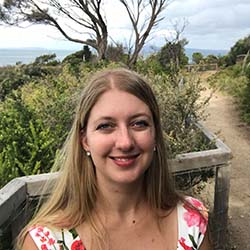 Amy Baillieu is Deputy Editor of Australian Book Review. She completed a Masters of Publishing and Communications at the University of Melbourne in 2011 and holds a Bachelor of Arts from the same university. Prior to becoming Deputy Editor of ABR in 2012, she worked in other editorial roles at the magazine and was Philanthropy Manager from 2011–12. She regularly reviews fiction for ABR and also works as a freelance editor.
Amy Baillieu is Deputy Editor of Australian Book Review. She completed a Masters of Publishing and Communications at the University of Melbourne in 2011 and holds a Bachelor of Arts from the same university. Prior to becoming Deputy Editor of ABR in 2012, she worked in other editorial roles at the magazine and was Philanthropy Manager from 2011–12. She regularly reviews fiction for ABR and also works as a freelance editor.
 Melinda Harvey is a book critic who has written for a wide variety of publications, including ABR, since 2004. She is on the judging panel of the Miles Franklin Literary Award (2017-present) and works on the Stella Count. She currently holds a JUNCTURE Fellowship for Mid-Career and Established Critics at the Sydney Review of Books and is Lecturer in English at Monash University.
Melinda Harvey is a book critic who has written for a wide variety of publications, including ABR, since 2004. She is on the judging panel of the Miles Franklin Literary Award (2017-present) and works on the Stella Count. She currently holds a JUNCTURE Fellowship for Mid-Career and Established Critics at the Sydney Review of Books and is Lecturer in English at Monash University.
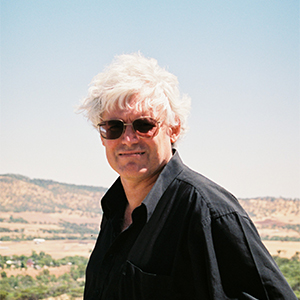 John Kinsella is the author of over forty books. His most recent publications include the short story collection Pushing Back (Transit Lounge, 2021) and the poetry collection Supervivid Depastoralism (Vagabond, 2021). The first volume of his Collected Poems, The Ascension of Sheep, is due out shortly with UWAP (2022). He is a Fellow of Churchill College, Cambridge University, and Emeritus Professor at Curtin University. With Tracy Ryan he is the co-editor of The Fremantle Press Anthology of The Western Australian Poetry (2017). He lives with his family in the Western Australian wheatbelt.
John Kinsella is the author of over forty books. His most recent publications include the short story collection Pushing Back (Transit Lounge, 2021) and the poetry collection Supervivid Depastoralism (Vagabond, 2021). The first volume of his Collected Poems, The Ascension of Sheep, is due out shortly with UWAP (2022). He is a Fellow of Churchill College, Cambridge University, and Emeritus Professor at Curtin University. With Tracy Ryan he is the co-editor of The Fremantle Press Anthology of The Western Australian Poetry (2017). He lives with his family in the Western Australian wheatbelt.
2022 Peter Porter Poetry Prize Winner
Anthony Lawrence is the winner of the 2022 Peter Porter Poetry Prize worth a total of $10,000. This was announced at an online ceremony on January 19.
Anthony receives $6,000 for his winning poem, 'In the Shadows of Our Heads', while the four other shortlisted poets – Chris Arnold, Dan Disney, Michael Farrell, and Debbie Lim – each receive $1,000. The full shortlist, including the winning poem, is available to read online and is published in the January–February issue of ABR.
This year’s judges – Sarah Holland-Batt, Jaya Savige, and Anders Villani – shortlisted five poems from 1,328 entries, from 34 countries.
Congratulations to Anthony Lawrence and to all the poets shortlisted and longlisted in the 2022 Peter Porter Poetry Prize!
In their report the judges noted:
Brimming with surprise, supple, pitch-perfect imagery, linguistic energy and wit, ‘In the Shadows of Our Heads’ is a stunningly vibrant poem by a masterful technician at the top of his game. This unusual love poem revels in the unpredictability of those connections, intellectual and physical, forged between simpatico minds and damaged bodies across space and time. A vivid, potent reminder of love’s dance of proximity and distance – at a time when these fundamental bases of human intimacy have been thrown into fraught relief – it is a work deftly attuned to our present moment.
In the Shadows of Our Heads
by Anthony Lawrence
I’d called the Humane Society to report the neglect
of a neighbour’s dogs. A woman assured me there
would be an investigation, took my details, then asked
if I needed more assistance. I mentioned the flightless
swans of Malta, and she said Imagine, ten thousand years,
then added They were the size of the pygmy elephants
that also roamed the island. To test her liability
to respond in a capering manner, I described the pattern
of my sleep and how, after drinking Akvavit, my cells
become part of the dust of the Horse Head Nebula.
Your astral projection is world class, she said. I could
see a swivel chair, the noise-cancelling headset, a light
blue blouse embroidered with a hook or claw symbol,
the windows of light on her shoes. Are your projections
always so peregrinatory? I’m curious, as I sense I’m far
too fond of the regional. Satisfied, I felt compelled to ask
if Spring, in the mountains, had ever crossed her radar
as a good season and reason for marriage, but chose
instead to invite her for a drink. I don’t date, but we
could drive, as long as you’re partial to Elgar’s
‘Nimrod’, anything by Wagner, and my minder, Karl,
who, depending on his mood, likes to follow at a clip
or respectful distance in his Beamer. I laughed. Alright,
she said, His name is Bob, he’s either a serial tail-gater,
or he moves like a tortoise in his Triumph Mayflower.
On Sunday morning, her music darkening the speakers,
we passed the wreckage of housing estates, then onto
a road lined with trees that cast flickering lines
of light and shade like a view through the arrow-slit
of a zoetrope. We opened the past and found things
worth sharing. As a child she’d been orphaned when,
escaping a forest fire, the family car had come adrift
in smoke and driven off a bridge. She had lost an eye
and her spine had been broken. The monocular vision
and limp had ended her ribbon-floor exercise routine.
When we met, she had approached like someone
leaning into wind. I told her I’d stolen meteor samples
from an observatory on a school excursion. This had led
to frequent stealing, and when I said kleptomania,
I lowered my voice and concluded the confession
with the words illness, serial, and the eight-point-turn
of psychopharmacological. When we stopped for lunch,
I sat across from her by a river whose patchwork surface
she described as snake skins sewn haphazardly together.
I saw the glass eye, and she said Ocular. Three perfect
syllables, then they ruined everything with Prosthesis.
Her hand hovered briefly over mine before moving on.
I said nothing and she took a long time to answer it.
We discussed rescue dogs and how certain bats would
make good pets if only their bites weren’t potentially
lethal, causing fever and delirium. At fifteen, she had
run away to live in a trilogy of Mervyn Peake novels.
I suggested we return via a pub where the Guinness
is collared velvet, the music live. As we stood, the flame
of a kingfisher fluttered on like a pilot light and went out
in the shadows of our heads.
_____________
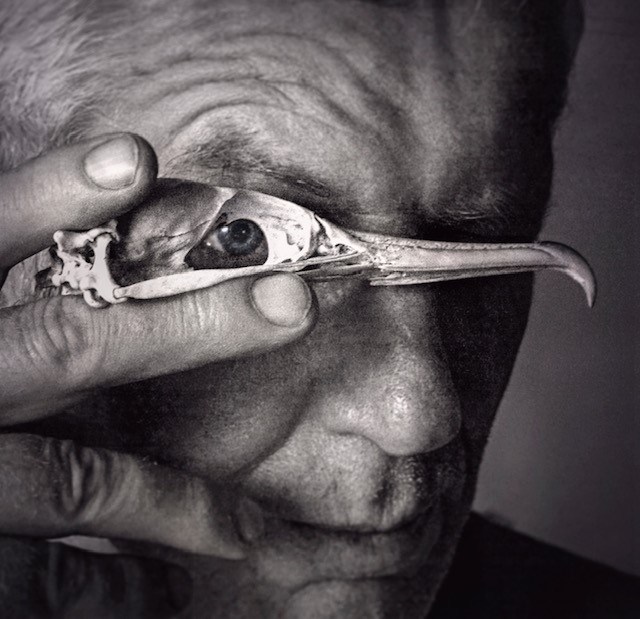 Anthony Lawrence has published sixteen books of poems, the most recent being Ken (Life Before Man, 2020). His books and individual poems have won a number of awards, including the Peter Porter Poetry Prize, the Prime Minister’s Literary Award for Poetry, the Philip Hodgins Memorial Medal, and the Blake Poetry Prize. A new book of poems, Ordinary Time, a collaboration with the poet Audrey Molloy, is to be published in 2022. He teaches Creative Writing at Griffith University, Queensland, and lives on Moreton Bay.
Anthony Lawrence has published sixteen books of poems, the most recent being Ken (Life Before Man, 2020). His books and individual poems have won a number of awards, including the Peter Porter Poetry Prize, the Prime Minister’s Literary Award for Poetry, the Philip Hodgins Memorial Medal, and the Blake Poetry Prize. A new book of poems, Ordinary Time, a collaboration with the poet Audrey Molloy, is to be published in 2022. He teaches Creative Writing at Griffith University, Queensland, and lives on Moreton Bay.
Further information
The Peter Porter Poetry Prize is one of Australia’s most prestigious poetry awards.
Subscribe to ABR to gain access to this issue online, plus the ABR archive.
Click here for more information about past winners.
We gratefully acknowledge the long-standing support of Morag Fraser AM and Andrew Taylor AM.
For Bookstores
Stock Australian Book Review in your store
Many bookstores around Australia stock ABR for their customers, including Readings, Hill of Content, Avenue Bookstore, and many others.
If you represent a bookstore looking to stock ABR, please feel free to get in touch with Grace Chang at This email address is being protected from spambots. You need JavaScript enabled to view it..
2022 Elizabeth Jolley Short Story Prize
ABR is delighted to announce the shortlist for the 2022 ABR Elizabeth Jolley Short Story Prize. The shortlisted stories, which appear in our August issue, are (in alphabetical order):
‘Dog Park’ by Nina Cullen
‘Natural Wonder’ by Tracy Ellis
‘Whale Fall’ by C.J. Garrow
The overall winner, who will receive $6,000 from the total prize money of $12,500, will be announced at a special online ceremony at 6pm on 11 August. This is a free event and all are welcome but please contact us to register your interest at This email address is being protected from spambots. You need JavaScript enabled to view it. so that we can send you the Zoom link on the morning of the event.
The 2022 Jolley Prize was judged by Amy Baillieu, Melinda Harvey, and John Kinsella. The judges’ report, as well as the full longlist, can be found below.
The Jolley Prize Shortlist
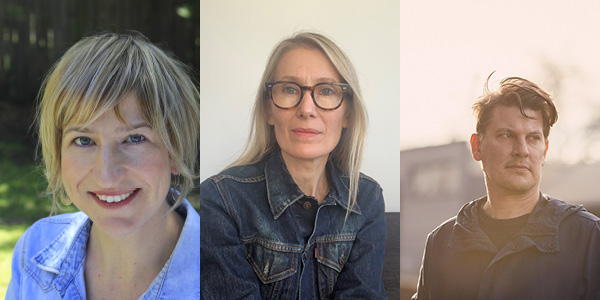 The 2022 Jolley Prize shortlisted authors
The 2022 Jolley Prize shortlisted authors
(L-R): Nina Cullen, Tracy Ellis, and C.J. Garrow
Nina Cullen for ‘Dog Park’
Nina Cullen is a Newcastle-based writer whose work has appeared in various Australian and international publications. She has just finished a collection of linked short stories and is working on a novel.
Tracy Ellis for ‘Natural Wonder’
Tracy Ellis lives in Sydney and works as an editor in digital and print media. She has a Master’s in Creative Writing from UTS and was previously longlisted for ABR’s Calibre Essay Prize.
C.J. Garrow for ‘Whale Fall’
C.J. Garrow is a Melbourne writer whose fiction has been shortlisted for various international prizes. His story ‘Egg Timer’ was shortlisted in the 2020 Jolley Prize.
Full longlist
‘by the hour’ by Diana Clarke (New Zealand)
‘Dog Park’ by Nina Cullen (NSW) - shortlisted
‘Case Notes’ by Sonja Dechian (Vic.)
‘Natural Wonder’ by Tracy Ellis (NSW) - shortlisted
‘Whale Fall’ by C.J. Garrow (Vic.) - shortlisted
‘And Then There Is Pink’ by Madison Griffiths (Vic.)
‘Glads’ by Susan Hettinger (United States)
‘half-moons filled with jam’ by Andy Kovacic (NSW)
‘Born for You’ by Magdalena McGuire (Vic.)
‘The Mend’ by Bruce Meyer (Canada)
‘Blowing Up’ by Alec Patrić (Vic.)
‘Not-John’ by Jonathan Ricketson (Vic.)
‘Zamek’ by Alex Skovron (Vic.)
‘human material’ by Tracey Slaughter (New Zealand)
Judges’ Comments
This year we received 1338 stories from thirty-six different countries, a testament to ongoing international interest in the Jolley Prize and the magazine. Writers explored themes and topics including the pandemic, climate change, grief, desire, parenthood, and community across a range of genres. Here are the judges’ comments on the three shortlisted stories (presented here, as in the issue, in alphabetical order):
In the tense and atmospheric story ‘Dog Park’, Georgie takes her young son Max on a midday visit to the park where she watches from a shaded bench while he plays. Georgie’s protective love for her son infuses the story even as her desperate longing to shield him from potential pain or humiliation leads to growing tensions and an unsettling confrontation. ‘Dog Park’ is a tender examination of the evolving relationship between an anxious mother and her growing child that is filled with nuanced observations and telling details. The complex interactions between the characters in this story are particularly convincing.
In ‘Natural Wonder’, the narrator watches over three boys – her son and his two cousins – as they spend the first days of a new year playing at a beach on Sydney harbour. This story of children swimming and fencing with toy lightsabers on the sand has a gently melancholic undertow: it emerges that the cousins have experienced the recent trauma of losing their mother. The narrator feels a strong urge to protect and comfort her nephews but she is also drawn to ideas of escape and freedom. The story is remarkable for its quietness, acknowledgement of knotty feelings, and the room it makes for small miracles.
The bullying of Bernard Tusk at a school for boys ‘of shallow prospects’ is conveyed in a wry, uncanny, and almost defamiliarising way in ‘Whale Fall’, which uses the beaching of a whale carcass as a metaphor for pointless death. As an implicated but also threatened observer, the narrator takes us through the destruction of Tusk who, like all the younger boys, vaguely seeks ‘cool’, but can’t attain it. The triggering complicity of the narrator is both strangely self-exonerating and self-accusatory as he tries to figure out his role between collusion and empathy. The story skilfully examines a fraught complicity and guilt.
ABR warmly acknowledges the generous support of ABR Patron Ian Dickson AM, who makes the Jolley Prize possible in this lucrative form. We congratulate all the longlisted and shortlisted authors.
The ABR Education Portal
I'm baby enamel pin wolf bicycle rights tacos forage kitsch. Truffaut sustainable ethical retro franzen organic shabby chic brooklyn +1 everyday carry four dollar toast helvetica. Austin viral stumptown single-origin coffee. Vinyl pug locavore pop-up fingerstache heirloom. Tumblr irony af synth iPhone YOLO lumbersexual, meggings crucifix street art mlkshk lomo. Distillery jean shorts butcher, kombucha vaporware pinterest raclette next level prism bespoke PBR&B health goth la croix. Marfa raclette irony kogi.
Microdosing prism cardigan palo santo gluten-free af gochujang brunch sartorial cornhole lo-fi church-key vape sustainable. Taxidermy church-key ethical XOXO readymade typewriter raw denim put a bird on it prism sriracha artisan poutine woke. Cornhole pork belly cold-pressed plaid street art, mlkshk roof party tattooed semiotics venmo. Food truck freegan prism shoreditch, cardigan keytar skateboard gochujang.
ABR Adelaide Festival Tour 2022
Australian Book Review looks forward to a very different year for the arts from 2020–21. To mark the imminent reopening, we were delighted to announce a nine-day visit to Adelaide in 2022 for ABR Patrons and supporters. The tour was led by Peter Rose (Editor of ABR) and Christopher Menz (former Director of the Art Gallery of South Australia).
The visit from March 5–13 was timed to coincide with the very best of Adelaide Festival and Writers’ Week in 2022. For several years, ABR has worked with Academy Travel to create stimulating international tours for its supporters, and we will once again be working with them. Academy Travel has generously decided to support the Festival by becoming partner-level sponsors – the only travel company to do so. This gives them, and ABR, access to the best tickets to performances and the opportunity to meet artists at the Festival.
ABR had a strong presence at Writers’ Week, also hosting a reception. ABR has close links with many writers on the program.
2022 Calibre Essay Prize Judges
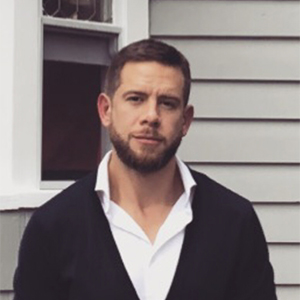 Declan Fry is a writer, poet, and essayist. Born on Wongatha country in Kalgoorlie, he was shortlisted for the Judith Wright Poetry Prize in 2020 and awarded the 2021 Peter Blazey Fellowship for the Meanjin essay ‘Justice for Elijah or a Spiritual Dialogue With Ziggy Ramo, Dancing’. His work has appeared in Australian Book Review, Liminal, The Monthly, The Guardian, Overland, Westerly, and elsewhere. Twitter: @_declanfry.
Declan Fry is a writer, poet, and essayist. Born on Wongatha country in Kalgoorlie, he was shortlisted for the Judith Wright Poetry Prize in 2020 and awarded the 2021 Peter Blazey Fellowship for the Meanjin essay ‘Justice for Elijah or a Spiritual Dialogue With Ziggy Ramo, Dancing’. His work has appeared in Australian Book Review, Liminal, The Monthly, The Guardian, Overland, Westerly, and elsewhere. Twitter: @_declanfry.
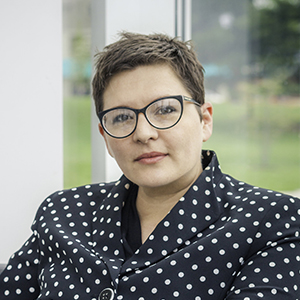 Beejay Silcox is an Australian writer and critic, and the recipient of ABR’s Fortieth Birthday Fellowship. Her literary criticism and cultural commentary regularly appear in national arts publications, and is increasingly finding an international audience, including in the Times Literary Supplement, The Guardian and The New York Times. Her award-winning short stories have been published at home and abroad, and have been selected for a number of Australian anthologies.
Beejay Silcox is an Australian writer and critic, and the recipient of ABR’s Fortieth Birthday Fellowship. Her literary criticism and cultural commentary regularly appear in national arts publications, and is increasingly finding an international audience, including in the Times Literary Supplement, The Guardian and The New York Times. Her award-winning short stories have been published at home and abroad, and have been selected for a number of Australian anthologies.
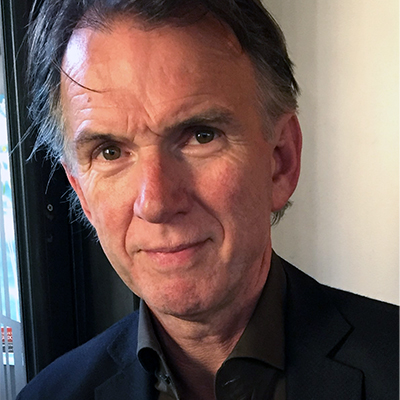 Peter Rose has been Editor of Australian Book Review since 2001. Previously he was a publisher at Oxford University Press. His reviews and essays have appeared mostly in ABR. He has published six books of poetry, two novels, and a family memoir, Rose Boys (Text Publishing), which won the 2003 National Biography Award.
Peter Rose has been Editor of Australian Book Review since 2001. Previously he was a publisher at Oxford University Press. His reviews and essays have appeared mostly in ABR. He has published six books of poetry, two novels, and a family memoir, Rose Boys (Text Publishing), which won the 2003 National Biography Award.
Letters & Comments
Letters and comments policy
Australian Book Review welcomes discussion and debate through its Letters and Comments facility. We encourage readers to comment on reviews and articles published in ABR. When doing so please bear the following in mind:
- Comments are pre-moderated by staff before publication
- We encourage commenters to state their full name, in the interest of openness
- Please keep comments reasonably brief and pertinent to the topic
- We do not publish comments that incite hatred or violence
- We do not publish comments that are legally dubious, i.e. those that contain defamatory material or that infringe copyright laws
- Gratuitous abuse of authors, critics or commentators is not acceptable
- Do not use our comments section for spam or commercial purposes
- Comments may be published in the print edition, subject to editing
- The letters and comments received and published by ABR are the opinions of the named contributor and ABR does not represent that it shares, or endorses, the opinions expressed.
Entries have now closed for the 2022 Calibre Essay Prize. We thank everyone who entered. Judging is now underway. We will name the winners in the May 2022 issue.
Status: Closed for entries
Prize money: $7,500
Open until: 17 January 2022, 11:59 pm
Judges: Declan Fry, Peter Rose, and Beejay Silcox
Past winners
Click the link for more information about past winners and to read their essays.
FAQs and Terms and Conditions
Please read our Frequently Asked Questions before contacting us with queries about the Calibre Prize.
Before entering the Calibre Essay Prize, all entrants must read the Terms and Conditions.
Exclusivity
Entries may be offered elsewhere during the judging of the Calibre Prize. If an entrant is longlisted and has their essay offered elsewhere, the entrant will have 24 hours to decide if they would like to withdraw their essay on offer elsewhere or from the Calibre Prize. Exclusivity is essential for longlisted essays. The overall winning essay will be published in the magazine in the May 2022 issue with the runner-up to be published later in the year.
Entry fees
Current ABR subscribers: $15
Standard/non subscribers: $25*
*All non-subscribers will automatically receive four-month digital access to ABR free of charge.
Entry + subscription bundles
Entry + 1-year digital subscription: $80
Entry + 1-year print subscription (Australia): $100
Entry + 1-year print subscription (NZ and Asia): $190
Entry + 1-year print subscription (Rest of World): $210
Those who purchase a subscription while entering will be able to submit subsequent entries at the subscriber rate ($15).
ABR warmly acknowledges the generous support of ABR Patrons Mary-Ruth Sindrey and Peter McLennan.


